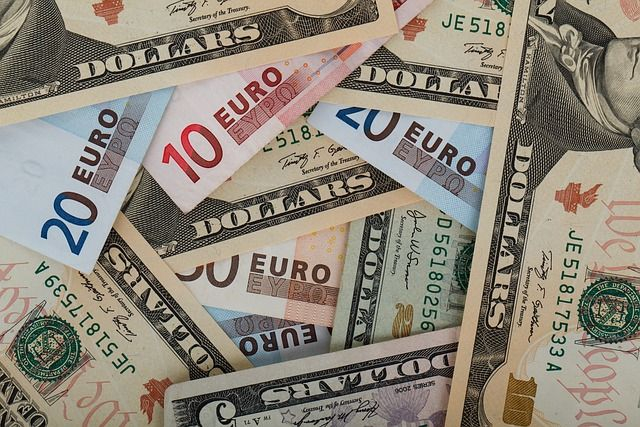Geopolitics and currencies
A look at the the evolution of the top foreign currencies in the current geopolitical context

Corina Cristea, 07.10.2022, 14:00
In the wake of the Russian invasion of Ukraine, the Euro dropped in February, while in September it fell below parity with the USD. Whereas in early 2022 a Euro was traded for 1.15 USD, last month the Euro temporarily dropped to the lowest level recorded in over 20 years. The situation also has to do with the geopolitical changes generated by the war in Ukraine. The war has worsened the economy of the Eurozone, making investors increasingly reluctant. In the context of the EU trying to curb its dependency on Russian oil and gas, energy costs have gone up exponentially across the community bloc, something which every European citizen can feel. Facing soaring prices for gas and considering Moscow could suspend natural gas deliveries at any point in time, investors fear a potential recession in the Eurozone. Economic pundits too expect a recession, saying it could be swifter and harsher in the EU than in the USA. The idea of a looming recession is gaining more and more popularity. Andrei Rădulescu, a director of macroeconomic analysis, says a new world order is being shaped up, expecting monetary flows and policies to be restructured and renegotiated between China and the USA.
“The latest evolutions of indicators from the US and the Eurozone clearly support the idea of a recession starting the second half of this year, therefore an economic crisis will soon follow. I believe this will not be a large-scale one, but rather an economic crisis similar to the one reported in the late 1990s. There will also be a social crisis in Europe. Unfortunately, in the all-out war between the United States and China, Europe has to foot the bill. Romania could bear a lower cost compared to Western countries, as we have a much lower degree of dependency on Russian oil and gas imports”.
The fact that the Federal Reserve has been stricter and more aggressive in terms of increasing the reference interest rate with a view to keeping inflation in check is another factor that has helped the USD to the detriment of the European currency. Therefore, amidst uncertainty impacting global economies, investors say they might favor the American currency for the business plans, which they regard as a traditionally safe currency in times of crisis. Economic analyst Sorin Pâslaru explains:
“The European Union doesnt have the same courage in the Eurozone today as the United States in terms of challenging inflation, because it fears the recession. As always, the Americans are more active. As soon as a situation develops, they tend to act, as weve seen with previous crises: they introduced the so-called quantitative relaxation, throwing a few thousand billions of dollars on the market in order to restore investor trust. Now, due to inflation, they have taken a risk to boost the inflation rate. They believe that, without increasing unemployment, and Ive even heard voices speaking about doubling unemployment, inflation can no longer be kept in check. Automatically, investors will go to America. We might, indeed, witness the USD consolidating its position also for geopolitical reasons”.
A Euro on the wane threatens to cause more difficulties to an already suffering economy by increasing inflation. The bad news is that an underperforming Euro in addition to the growing costs this entails will only aggravate the difficulties currently facing the European Central Bank, which has been criticized for introducing belated measures to increase the monetary police interest rate compared to other similar institutions. Whats worse for the ECB, who has to keep inflation at bay, is that the Euro didnt just drop against the USD, analysts claim, but also compared to other currencies, such as the Swiss Franc or the Japanese Yen.
The British Pound also hit an all-time low in September in its exchange rate against the USD, as a result of measures to curb taxation announced by the new Prime Minister, Lizz Truss, in the context of the energy crisis. Estimated at some 200 billion pounds, the measures had unclear financing sources and societal impact, and the government refrained to talk numbers. Consequently, they stirred up global markets, prompting the International Monetary Fund to make a historic announcement, calling on London to reconsider. “We had to take urgent action in order to help the economy grow and introduce measures to stop inflation. Obviously, that means making controversial and difficult decisions, something which as Prime Minister Im willing to do”, Prime Minister Truss said. The British Pound collapsed to an all-time low. The National Bank had to step in to save pension funds. The value of British businesses dropped by 500 billion Pounds in less than three weeks, while the rate of government loans increased across the UK to the highest level reported since the 2009 crisis, threatening to disrupt the financial well-being of the nation. The British Prime Minister has told the BBC that she continues to stand by this set of measures, and that increasing public loans was the right decision in order to help the population cover their energy costs. At the same time, media outlets write, Prime Minister Truss did not rule out curbing spending on public services and has made no promise to increase benefits in keeping with the inflation rate. Later, Lizz Truss admitted she will have to do a better job of announcing massive tax cuts that have caused panic on financial markets, and the British Government reversed some of the measures. (VP)






























